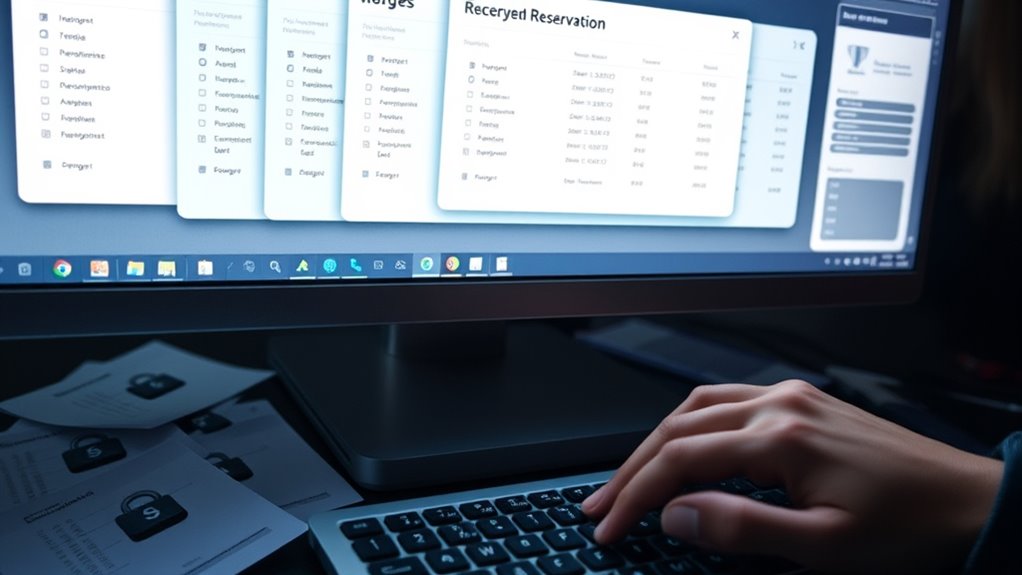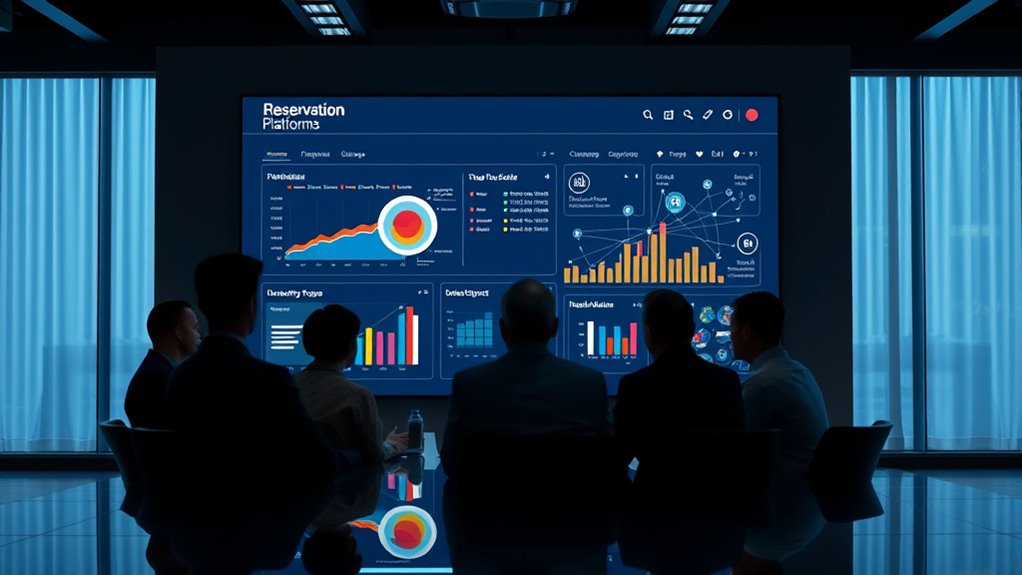Reservation platforms collect a lot of your personal and booking details, often claiming ownership of this data through their terms. You might have some control, like accessing or deleting your info, but privacy and security risks remain. Laws like GDPR and CCPA aim to protect your rights but can vary by region. To understand how ownership impacts your privacy and how these issues might evolve, keep exploring further.
Key Takeaways
- Reservation platforms typically claim ownership of collected user data, influencing user control and privacy rights.
- Data ownership models affect how users access, modify, or delete their reservation information.
- Regulatory frameworks like GDPR and CCPA require platforms to disclose data practices and obtain user consent.
- Data sharing with third parties depends on platform policies and legal compliance, impacting user privacy.
- Shifting towards user-controlled, decentralized data ownership enhances privacy, interoperability, and user trust.
The Scope of Reservation Data Collection

Have you ever wondered what kind of data reservation platforms collect? They gather a variety of information to facilitate your bookings and improve services. This includes personal details like your name, contact information, and sometimes payment data. Reservation platforms also track your preferences, such as seating choices, special requests, and previous booking history. They collect device information, IP addresses, and browsing behavior to optimize user experience and prevent fraud. Additionally, platforms may gather location data to offer nearby options or personalized suggestions. All this data helps streamline the reservation process, enhance customer service, and support marketing efforts. However, understanding exactly what data is collected and how it’s used is essential for knowing your rights and privacy.
Who Holds Ownership Rights?

When reservation platforms collect your data, questions about ownership rights naturally arise. Typically, the platform claims ownership of the data they gather, but your rights can vary depending on terms of service. Some platforms allow you to access or delete your data, while others retain control. It’s crucial to understand who owns what to protect your interests. Consider this: security vulnerabilities can pose risks to your data if not properly managed.
| Contributor | Platform Ownership |
|---|---|
| Your booking details | Platform may claim rights |
| Personal information | Rights often reserved by platform |
| Feedback or reviews | Sometimes owned by platform |
Being aware of these distinctions helps you know what rights you retain and what the platform controls. Clear policies ensure you’re not unknowingly surrendering your data rights.
Privacy and Data Security Concerns

As you use reservation platforms, privacy and data security are critical concerns that shouldn’t be overlooked. These platforms collect personal information like your name, contact details, and payment data, making you vulnerable if mishandled. Data breaches can expose sensitive information, leading to identity theft or financial fraud. Many platforms store your data on servers that might not have robust security measures, increasing the risk of hacking. Additionally, some companies share your data with third parties for marketing or analytics, often without clear consent. To protect yourself, always review privacy policies, use strong passwords, and enable two-factor authentication when available. Staying informed about how your data is stored and shared helps you make smarter choices and reduces your risk of privacy violations. Research supports the importance of understanding data ownership and how it impacts your privacy rights.
Impact of Data Ownership on Users and Providers

Data ownership substantially influences how users’ information is managed and how much control they have over their personal details. When platforms own your data, you may find it harder to access or delete your information, limiting your privacy. Providers, on the other hand, benefit by using your data to improve services or target advertising, which can increase profits but also raise ethical concerns. If users lack control, they might feel exposed or distrustful, reducing engagement with the platform. Conversely, clear ownership rights empower users to manage their data, fostering trust and loyalty. For providers, responsible data ownership can enhance reputation and compliance, while mishandling data risks legal penalties and brand damage. Ultimately, data ownership shapes the relationship dynamics between users and platforms, impacting trust, security, and growth. Recognizing how personal growth principles apply to digital privacy can help users advocate for more equitable data practices.
Legal Frameworks and Regulations Governing Data

You need to understand how data privacy laws protect your information and what rights you have over your data. Clear ownership rights are essential to prevent confusion between users and providers. Additionally, cross-border regulations can complicate data management when platforms operate internationally. Recognizing the importance of data ownership can help ensure your rights are protected and properly managed.
Data Privacy Laws
Guiding through the complex landscape of data privacy laws is vital for reservation platforms to protect user information and maintain trust. Laws like the GDPR in Europe and CCPA in California set strict standards for handling personal data. You must guarantee transparent data collection practices, obtain clear user consent, and provide options to access or delete personal information. Failing to comply can lead to hefty fines and damage your reputation. Keep in mind that regulations often require you to implement security measures to prevent unauthorized access and data breaches. Regular audits and updates to your privacy policies are essential. Staying informed about evolving legal standards helps you balance data utility with user rights, fostering trust and safeguarding your platform against legal risks. Additionally, understanding data ownership principles ensures that users retain control over their personal information throughout its lifecycle.
Ownership Rights Clarity
Understanding who owns the data collected through your reservation platform is essential, as legal frameworks and regulations define and protect these rights. To navigate this landscape, you need to contemplate:
- Ownership Laws: Different jurisdictions assign data rights to either the platform, the user, or both.
- Terms of Service: Clear agreements specify who holds ownership and how data can be used.
- Data Protection Regulations: Laws like GDPR or CCPA set rules for data control and user rights.
- Intellectual Property Rights: These may influence who can claim ownership over the data and its use.
- Device Capabilities: Features like those found in electric bikes can also impact data ownership, especially regarding user activity and performance data collected during use.
Cross-Border Regulations
Cross-border data regulations create a complex legal landscape that platforms must navigate to guarantee compliance. Different countries impose varying rules on how data is stored, transferred, and accessed across borders. You need to understand regulations like the GDPR in Europe, which restricts data transfer outside the EU unless specific safeguards are in place. Similarly, countries like China and Russia have strict data localization laws requiring data to be stored within their borders. These legal frameworks can restrict your ability to share data seamlessly across jurisdictions. To stay compliant, you must implement robust data management strategies, such as data localization and secure transfer protocols. Additionally, understanding floating on water concepts can help in designing systems that accommodate water-based or aquatic environments where data might be used or accessed. Ignoring these regulations risks hefty fines, legal action, and damage to your reputation. Staying informed and adaptable is essential in this ever-changing legal environment.
Future Trends and Challenges in Reservation Data Management

As reservation platforms evolve, you’ll need to navigate changing data privacy regulations that could impact how you handle user information. Interoperability challenges will also grow, requiring you to make certain that seamless data sharing across different systems. Additionally, shifts in ownership models may redefine your control and responsibility over reservation data moving forward. Maintaining transparency with users regarding affiliate relationships and data usage will become increasingly important to build trust and comply with regulations.
Data Privacy Regulations
With increasing concerns over personal data security, future trends in reservation data management will see stricter privacy regulations shaping how platforms collect, store, and share user information. You can expect:
- Enhanced consent protocols requiring clear user permissions before data collection.
- Greater transparency with detailed data usage disclosures.
- Tighter restrictions on third-party data sharing and integrations.
- Mandatory data minimization, collecting only essential information.
- A focus on personal and community resilience in data protection practices to ensure comprehensive security.
These trends aim to protect user privacy while maintaining service efficiency. As regulations evolve, you’ll need to stay compliant, adapt data handling practices, and prioritize user trust. Platforms that proactively implement robust privacy policies will better navigate the changing legal landscape, reducing risks and fostering long-term customer loyalty. Staying ahead means embracing these regulations now, rather than reacting later.
Interoperability Challenges Ahead
As reservation platforms adopt stricter privacy regulations, ensuring seamless data flow across different systems becomes increasingly complex. You’ll face technical hurdles like incompatible data formats and inconsistent standards that hinder interoperability. Different platforms may use varied APIs, making real-time data exchange difficult. Additionally, security protocols can create friction, slowing down data sharing or causing gaps. Maintaining synchronization without compromising privacy requires sophisticated solutions, but implementing these can be costly and time-consuming. You must also navigate legal and regulatory differences across regions that impact data transfer. These challenges threaten to fragment reservation data ecosystems, reducing efficiency and user experience. To stay competitive, you’ll need to invest in adaptable, secure, and standardized data exchange methods that can evolve with evolving privacy laws. Moreover, understanding credit card security measures is essential to protect sensitive customer information during data exchanges.
Ownership Model Shifts
Ownership models for reservation data are shifting from centralized repositories to more distributed and user-controlled frameworks, reflecting evolving privacy concerns and technological capabilities. This change empowers you to have greater control over your data and how it’s shared. As these models evolve, expect several key trends:
- Increased adoption of blockchain for secure, transparent ownership records.
- Greater use of decentralized platforms that let you manage your reservation data directly.
- Enhanced privacy features enabling you to limit data access and sharing.
- Shift toward owner-centric data portability, allowing you to transfer your reservation info easily across platforms.
These shifts challenge traditional models, demanding new standards for data security, interoperability, and user rights. Staying informed helps you navigate this evolving landscape confidently.
Frequently Asked Questions
How Do Different Countries’ Laws Affect Reservation Data Ownership?
Different countries’ laws substantially impact who owns reservation data. In some places, data is considered the property of the platform, giving them control. In others, laws emphasize user rights, making travelers’ data protected and requiring transparency. You need to understand local regulations to guarantee compliance. When managing international reservations, always stay aware of these legal differences to protect your business and respect user privacy.
Can Users Transfer Their Reservation Data to Other Platforms Easily?
Ever dreamed of magically transferring your reservation data across platforms with a flick of your digital wand? Sadly, it’s not that simple. You probably find it frustrating that moving your data isn’t a smooth ride, thanks to proprietary formats and platform restrictions. You’re left juggling multiple accounts, duplicating info, or just sticking to one platform—making the idea of seamless transfer feel more like wishful thinking than reality.
What Are the Economic Implications of Data Ownership for Small Providers?
You should consider how data ownership affects small providers’ economics. When you own your data, you gain control over customer relationships and can use insights to improve offerings or target marketing efforts. This independence can reduce reliance on third-party platforms and fees, boosting profitability. Conversely, losing data ownership might mean limited growth opportunities, higher costs, and reduced competitiveness in a crowded market. You, as a small provider, benefit most from retaining control over your data.
How Does Data Ownership Influence Reservation Platform Competition?
Data ownership shapes how reservation platform competition unfolds. When you control your data, you can better differentiate your services and build customer loyalty. If platforms own the data, they gain more power, potentially stifling smaller providers like you. This creates a competitive imbalance, making it harder for you to compete effectively. Ultimately, data ownership influences platform rivalry by affecting trust, innovation, and market dynamics, shaping the landscape you operate in.
Are There Ethical Concerns Related to Reservation Data Monetization?
Think of reservation data as a double-edged sword—you gain insights but risk cutting into privacy. You might wonder if monetizing this data is ethical, especially when customer trust is at stake. You could inadvertently exploit personal information or create unfair competitive advantages. It’s essential to balance profit with responsibility, respecting user privacy and ensuring transparency. Otherwise, you may damage your reputation more than any potential financial gain.
Conclusion
As you navigate the landscape of reservation platforms, remember that the delicate dance of data ownership shapes a garden filled with both opportunity and responsibility. By tending to privacy and security with care, you help cultivate trust and harmony between users and providers. Embrace the evolving legal frameworks like gentle breezes guiding your way, ensuring your journey remains steady and bright. Together, you can nurture a future where data flows like a peaceful stream, enriching everyone involved.









